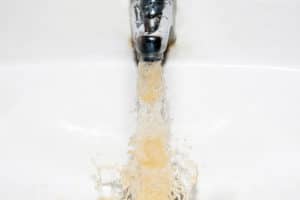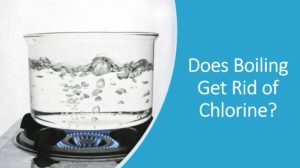There are over 316 contaminants in drinking water across America, according to the Environmental Protection Agency. That means common odors may come from tap water, and a nauseating rotten egg smell may be one of them.
Why Does My Water Smells Like Rotten Eggs?
If your water smells like rotten eggs, first of all, don’t panic. The rotten egg odor is caused by levels of sulfur bacteria and hydrogen sulfide gas. It can occur when water comes in contact with organic matter or certain minerals, such as pyrite. If you use city water, most of this bacteria is killed with chlorine, but if you’re on well water, more of these naturally occurring organisms are in your water.
While sulfur bacteria is not a threat to your health, it promotes the growth of other harmful materials such as iron that can clog wells and plumbing systems. It’s best to tackle the rotten egg smell head-on to see where the issue lies.

How Do I Get Rid of the Rotten Egg Smell in My Water?
How do you get rid of the sulfur smell? First, you will need to do a little investigating and follow your nose (quite literally!) to locate the smell’s source.
Find the Source of the Rotten Egg Smell:
First, check your drains to see if they smell. Sometimes drain lines have a trap that prevents sewer gas from coming up through. If you don’t use your sink for a while, the water trap can evaporate, allowing the nasty smelling in your home.
Next, try running both hot and cold water from all the faucets in your home and check to see if the smell comes from only the hot water, only the cold water or both. If the smell is only coming from your hot water, the problem most likely exists within your water heater.
If your cold water smells too, see if the stench comes from faucets not connected to the water softener. If the answer is no, the issue lies in your water softener. If the answer is yes, check if the smell decreases after the water runs for a few minutes. If the answer is yes, the problem is likely in the well or plumbing system. If the answer is no, the issue is likely in your ground/well water.
Also, note whether the smell comes from all of your faucets or only some isolated areas. If it comes from just one or two faucets, the problem most likely exists in your drains and does not affect your whole water supply.
You can also test your water. If you have city water, contact your water utility plant for an analysis of your water quality. If you have well water, test your water with a general mineral water analysis that analyzes levels of pH, iron, manganese, hardness, total dissolved solids, sulfate, and hydrogen sulfide. With these results, you can better understand the source of the rotten egg smell.

OK, I Found the Source of the Smell, What Now?:
Once you know the source of the smelly sulfur, you can focus on solutions. All solutions concentrate on preventing the formation of sulfur or killing the bacteria that causes it.
Drain
If the source is just the drain and not the water, try pouring a couple of teaspoons of baking soda in the drain, followed by a cup of white vinegar. The foaming of the baking soda/vinegar will eat away at anything clogging the drain. After a few minutes, pour several cups of boiling water to wash it down and sanitize the drain. If the smell dissipates, you have solved the problem.
Water Heater
If the smell comes from the hot water only, the problem is likely the water heater. Try flushing it out by connecting a hose to the drain valve of your water heater. Place the other end of the hose outside where excess water can run. After ten minutes, fill a cup to see if there are little sediment particles in the water. Repeat the steps until the water runs clear.
You can also try disinfecting your water heater by turning the temperature to 160 degrees Fahrenheit and letting it run for a few hours, which should kill all bacteria.
If this doesn’t work or you don’t want to take these steps, the best course of action is to contact a water system professional who may replace your magnesium anode. This attachment is connected to a plug on the top, and replacing it may cut the production of hydrogen sulfide gas. However, the rod’s removal will likely decrease the life of your water heater.
Water Softener
If the smell comes from both hot and cold water faucets, but only water treated by a water softener, the problem is likely your water softener. Changing the water softener solution should solve this.
Well and Plumbing
If the rotten egg smell diminishes after the water is left on for a few minutes, the issue likely exists in your well or plumbing. Your best course of action is to have a professional inspect your well and plumbing system. More than likely, they will “shock” the well system with chlorine, which reduces the hydrogen sulfide.
Ground/Well Water
If the rotten egg smell does not disappear after running both hot and cold water for several minutes, the problem is probably in your groundwater. You should hire a professional to assess your groundwater for the issue and offer solutions such as Sulfur removal systems.
What other effects can sulfur have?
High levels of sulfur can leave stains on your plumbing fixtures, sinks, and toilets. It can also discolor silverware. The presence of sulfur bacteria also produces a breeding ground for other bacteria to grow. This can end up being a problem that needs to be addressed.
Benefits of a Whole House Water Filter
If you have well water, and the sulfur smell comes from every faucet, you would benefit from a whole house well water filtration system with a UV filter. This system will remove the hydrogen sulfide and bacteria, which will reduce bad odors, damage from sulfur, and protect you and your family from other chemicals and contaminants.







